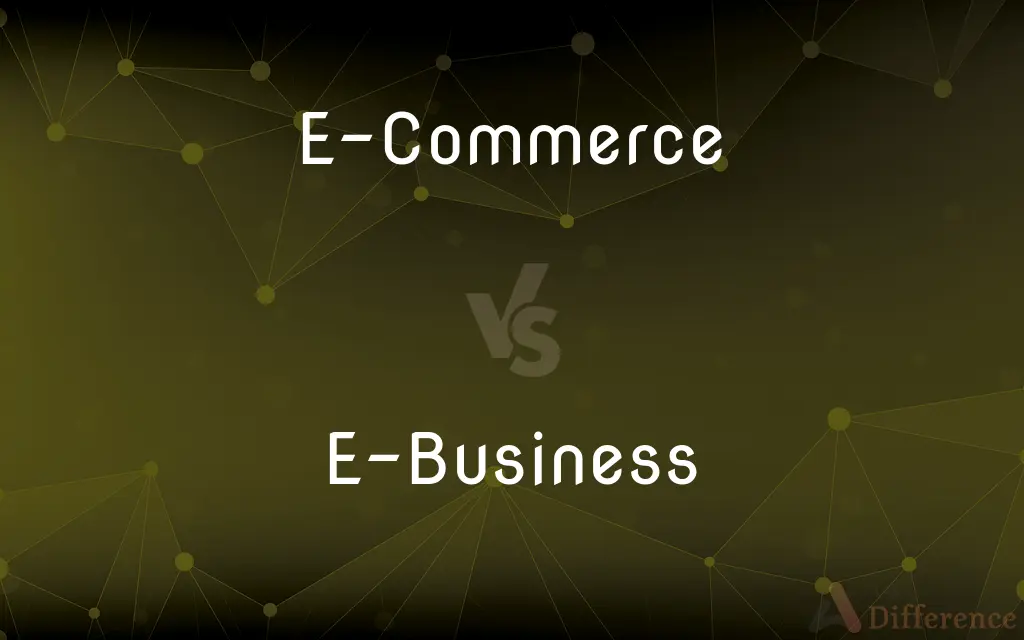E-Commerce vs. E-Business — What's the Difference?
Edited by Tayyaba Rehman — By Fiza Rafique — Published on December 19, 2023
E-Commerce involves online buying and selling, while E-Business encompasses all internet-based business activities.

Difference Between E-Commerce and E-Business
Table of Contents
ADVERTISEMENT
Key Differences
E-Commerce primarily refers to the online trading of goods, services, or information. On the other hand, E-Business encompasses a broader spectrum, covering all electronic business processes, not just commercial transactions.
While E-Commerce could be seen as the virtual equivalent of physical stores, E-Business might be likened to the entirety of a company's digital presence and operations.
E-Commerce is essentially a subset of E-Business. Where E-Commerce might focus on sales through a website, E-Business could also include online HR management, virtual project management, and electronic customer relations.
The platforms that enable E-Commerce are online marketplaces, store websites, or sales portals. In contrast, E-Business tools might span from CRM software to intranet networks.
When discussing the digital transformation of traditional businesses, E-Commerce specifically means adapting sales to online platforms. Meanwhile, transitioning to E-Business implies digitizing multiple facets of the enterprise, from supply chain management to customer support.
ADVERTISEMENT
Comparison Chart
Scope
Online trading
All electronic business processes
Components
Online sales, payments
CRM, HR, project management, sales
Representation
Online storefronts
Entire digital business operations
Example
Amazon, eBay
Salesforce, Zoom, Google Workspace
Primary Focus
Buying/selling online
Digital conduct of business
Compare with Definitions
E-Commerce
Digital platform for commercial transactions.
Shopify allows businesses to establish their E-Commerce presence.
E-Business
Digital operations of an enterprise.
Slack is a tool used in the E-Business realm for team communication.
E-Commerce
Online buying and selling of goods.
Amazon revolutionized E-Commerce with its vast online marketplace.
E-Business
All electronic business activities.
Companies like Google cover a spectrum of E-Business from search engines to software development.
E-Commerce
Internet-based retailing.
Many brick-and-mortar stores pivoted to E-Commerce during the pandemic.
E-Business
Conducting business electronically.
Online webinars, virtual team meetings, and digital contracts all fall under E-Business.
E-Commerce
Web-based sales activities.
Black Friday sales skyrocket on E-Commerce platforms.
E-Business
Business conducted through digital means.
DropBox facilitates E-Business by allowing cloud-based document sharing and collaboration.
E-Commerce
Electronic trading of products/services.
Etsy showcases how E-Commerce can cater to niche markets.
E-Business
Internet-enabled business processes.
Remote work relies on E-Business tools for seamless workflow.
E-Commerce
Commerce that is transacted electronically, as over the internet.
E-Business
The practice of servicing businesses or employees over the Internet.
E-Commerce
Commercial activity conducted via the Internet.
E-Business
The practice of running a business over the Internet; e-commerce.
E-Commerce
2005|year=2006|publisher=Apress|page=xxi|pageurl=https://books.google.com/books?id=4ShE_7yml28C&pg=PR21&dq=%22e-commerce%22+web&hl=&cd=20&source=gbs_api#v=onepage&q=%22e-commerce%22%20web&f=false|isbn=978-1-4302-0079-6|passage=The last thing you need to do before launching the e-commerce site is enable credit card processing.}}
E-Business
A business that operates partially or primarily over the Internet, usually providing services to other businesses.
Common Curiosities
How is E-Business broader than E-Commerce?
E-Business encompasses all internet-based business activities, not just online sales.
What platforms are associated with E-Commerce?
Platforms like Shopify, WooCommerce, and Amazon.
What does E-Commerce specifically deal with?
It deals with buying and selling products or services online.
Which term encompasses digital marketing: E-Commerce or E-Business?
E-Business, as it covers all facets of digital business, including marketing.
Are mobile apps for shopping considered E-Commerce?
Yes, they are a part of the E-Commerce domain.
Is every online business involved in E-Commerce?
Not necessarily. Some might only provide information or services without direct sales.
Can a company have E-Commerce without E-Business?
Typically, no. Even basic online sales (E-Commerce) involve some broader electronic business processes (E-Business).
Which tools or platforms are typical for E-Business?
Tools like Salesforce, Google Workspace, and Microsoft Teams.
Does E-Business always involve sales?
No, it can include other operations like HR, communications, and supply chain management.
Can a business be successful today without transitioning to E-Commerce or E-Business?
It's challenging, as digital presence and operations offer competitive advantages in many industries.
Share Your Discovery

Previous Comparison
Primary Cells vs. Secondary Cells
Next Comparison
Tasks vs. DutiesAuthor Spotlight
Written by
Fiza RafiqueFiza Rafique is a skilled content writer at AskDifference.com, where she meticulously refines and enhances written pieces. Drawing from her vast editorial expertise, Fiza ensures clarity, accuracy, and precision in every article. Passionate about language, she continually seeks to elevate the quality of content for readers worldwide.
Edited by
Tayyaba RehmanTayyaba Rehman is a distinguished writer, currently serving as a primary contributor to askdifference.com. As a researcher in semantics and etymology, Tayyaba's passion for the complexity of languages and their distinctions has found a perfect home on the platform. Tayyaba delves into the intricacies of language, distinguishing between commonly confused words and phrases, thereby providing clarity for readers worldwide.












































